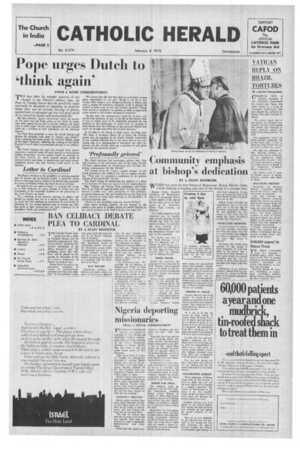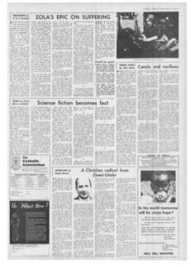Page 1, 6th February 1970
Page 1

Page 2

Report an error
Noticed an error on this page?If you've noticed an error in this article please click here to report it.
Tags
Share
Related articles
Opinion
Dutch Group May Seek New Bishops
Pope Sees Cardinal Alfrink On Celibacy
Dutch Church Split Feared On Celibacy
Two Cardinals In Synod Call To Change Celibacy Law
Pope urges Dutch to 'think again'
FROM A ROME CORRESPONDENT °TWO days after his outright rejection of any changes in the Church's celibacy rules, the Pope on Tuesday hinted that the possibility might eventually be discussed of ordaining, in countries where there was an extreme shortage of priests, married men of advanced age who had given proof of an exemplary family and professional life.
He had, however, "grave reservations" about the matter. At the same time the Pope called on the Dutch to reconsider their appeal for an end to priestly celibacy. He asked them to think again "on the views expressed and the attitude taken on a question of such importance for the universal Church."
But Pope Paul promised to meet the Dutch bishops and discuss the situation with them in "prayer and charity". Such a meeting had been sought by Cardinal Alfrink, head of the Dutch hierarchy, following the meeting of the Dutch Pastoral Council which recommended changes in the celibacy rules.
The Dutch bishops had said they thought their church community would be better off when, besides a freely-chosen celibate priesthood, married priests would be admitted in the Latin Church, i.e., when married people could be ordained priests and when, in special cases and under certain conditions, priests who had married could return to the ministry.
Letter to Cardinal
The Pope's reference to the possibility of allowing married men of mature age to become priests in countries where there are shortages and his appeal to the Dutch were contained in a letter to Cardinal Villot, the Papal Secretary of State. He said he did not want to forget "a question that is put to us with insistence by many bishops of whose zeal and attachment to the venerable tradition of the priesthood in the Latin Church we know.
"In a situation of an extreme shortage of priests, and limited to regions that are in a similar situation, they ask us, could not there perhaps be considered the eventuality of ordaining for the sacred, ministry men of mature age who had given in their environment the good testimony of an exemplary family and professional life? "We cannot hide the fact that such an eventuality arouses grave reservations on our part. Would it not be in fact among other things a very dangerous illusion to believe that such a change of traditional discipline could in practice be limited to local cases of real and extreme necessity? Would there not be a temptation in addition to seek an apparently easier answer to the present shortage of vocations?
"In any case, the consequences would be so grave and would raise questions so new to the life of the Church that, if ever, it would have to be attentively examined by our brothers in the Episcopate in union with us, keeping in mind before God the wellbeing of the universal Church that could not be separated from that of local churches."
In his plea to the Dutch to think again, the Pope said: "We deem it necessary above all to assure the bishops, priests and all members of the Dutch Catholic community of our constant affection but at the same time of our conviction that it is indispensable to reconsider the views expressed and the attitude taken on a question of such grave import for the universal church."
Profoundly grieved'
The Dutch decisions had profoundly grieved him. They were contrary to the sacrosanct rules of the Latin Church, will have repercussions on all believers and will have disturbing consequences for the Church." The reasons given for "such a radical change," as the Dutch proposed in the celibacy law, did not appear convincing. "They seem to represent a weakening in the genuine concept of the priesthood," he said. The Pope's means of announcing his position in a letter to his Secretary of State was unusual but not unprecedented. Mgr. Vallainc, the Vatican Press spokesman, said Popes Pius X and Pius XI used the same form "to treat in a confidential if public way" with secretaries of state problems of special importance. He said he believed that the Pone had Latin America in mind when referring to the possibility of ordaining /married men. "Above all. this possibility does not concern Holland." Pope Paul's outright rejection of any changes in the celibacy rules came on Sunday during his weekly blessing to the crowds gathered in St. Peter's Square (see page five). The Pope said that celibacy was a fundamental law of the Church and more than ever valid in our time. To abandon it would be "a step back. It would mean a lessening of that faithfulness of love and sacrifice which our Latin Church, after consummate experience and, with immense courage and steady evangelism has imposed on its effort of severe selection and perennial renewal of the priestly ministry, on which depends the vitality of all its people."
The Pope said that celibacy "is certainly a high and commanding standard, whose observance demands an irrevocaable promise, a special charisma, that is to say a superior and interior grace."
By remaining celibate, priests were following in the footsteps of the disciples who abandoned everything to serve Christ. The law "enables the priest to dedicate himself completely and exclusively with undivided heart to 'his ministry to the faithful and the Christian community."
This made celibacy "a supreme witness to the reign. of God, a unique sign which
testifies to the value of faith, of hope, of Jove ... and Christian perfection.. Yes, it is difficult. But it is exactly this characteristic which makes it attractive to the young and ardent soul," the Pope said. -We must conserve it and defend it."
The Pope called on Catholics to pray for him,. and to pray that celibacy "becomes better understood by both clergy and laity so that they both esteem and venerate it."
The Dutch hierarchy, at a meeting on Sunday after the Pope's remarks had been reported, issued a statement which said: "The bishops are stele in contact with the Holy See. They do not have the impression that the Pope's speech is meant -as an answer to the anxieties which they have placed before him."
blog comments powered by Disqus











